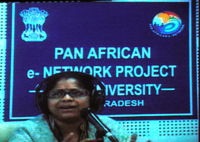INDIA: Engaging Africa With Software and Soft Power

India cannot match rival China’s massive investments in Africa, but it is using its information technology capabilities and its affordable university courses to stay relevant on the continent.
'How do you matter to Africa? India cannot obviously compete with either China or the United States, but it was this country which inspired the anti- colonial struggles of the last century and took a stand against apartheid,' says Ajay Kumar Dubey of the Jawaharlal Nehru University’s department for Africa studies.
Dubey points to the Pan-African e-Network project as a classic example of what India has been doing to win friends in Africa and to also get a share of the continent’s markets and resources for its own expanding economy at home.
Besides providing tele-medicine and tele-education services the Pan-African e-Network facilitates easy video-conferencing among African heads of states across 33 nodes.
The Pan-African e-Network is 'the finest example of partnership between India and Africa,' said Indian Foreign Minister S.M. Krishna when he inaugurated the second phase of the 125 million dollar project in August 2010 from the New Delhi studios of the government-owned Telecommunications Consultants India Ltd. (TCIL).
Kicked off on Feb. 16, 2009 the first phase of the project covered Benin, Burkina Faso, Ethiopia, Gabon, Gambia, Ghana, Mauritius, Nigeria, Rwanda, Senegal and Seychelles. With the second phase, Botswana, Burundi, Cote d’Ivoire, Djibouti, Egypt, Eritrea, Libya, Malawi, Mozambique, Somalia, Uganda and Zambia are on board.
'We were able to prove a point with this project,' TCIL executive Rajesh Kapoor told IPS. 'Here is the practical implementation of a simple but great idea to bring people together.'
There is reason for people like Kapoor to be upbeat. Last year the project bagged the 2010 Hermes Prize for Innovation, instituted by the European Institute of Creative Strategies (EICS), a think tank that promotes strategies for innovation and renewal worldwide.
EICS described the satellite and fibre-optic communication network as 'the most ambitious programme of distance education and tele-medicine in Africa ever undertaken: the first example of large Project South-South development support.'
Currently some 2,000 African students are registered - through the e- Network - with prestigious Indian educational institutions such as the Indian Institute of Science, the University of Madras, the Delhi University, the Indira Gandhi National Open University, the Amity University, and the Indian Institute of Technology at Kanpur.
Partner African tele-education centres have been set up at the Kwame Nkrumah University of Science and Technology in Ghana, the Makerere University in Uganda, and Cameroon’s Yaounde University.
Makerere University has devoted two lecture rooms to the programme. They are fitted with state of the art e-learning technology and video conferencing facilities linked to India’s privately run Amity University. There is full interaction between the lecturers and the students.
Davies Rwabu, a second year Master of International Business student told IPS that the programme caters to busy students. 'You have online video conferencing once a week for about three hours, and then you can still catch up with the notes online because we have a portal from which we can pick up the notes,' Rwabu explained.
Rwabu said the system allows for offline access to the lecture contents, which are stored in a database for review learning and access to lecturers in India.
Students pay a subsidised fee of 200 dollars per semester at Makerere, which compares well with the regular 1,240 dollars for comparable courses.
Earnings from running the courses are not sent back to India, they are used to pay local technicians running the learning centres as well as the project’s coordinator.
Amity University courses available through the Makerere centre lead to a diploma in information technology, and master’s degrees in financial management and control and international business.
When the programme was launched in August 2009, 236 Ugandan students enrolled and the number doubled the following year. A third round of enrolment is slated for July 2011.
The current objective of the project, Kapoor said, is to assist Africa in building capacity by imparting quality education to 10,000 students across the continent over a five-year period.
Apart from the Pan-African e-Network, India has extended assistance to several African nations by way of training of experts and implementation of projects.
Over 1,000 officials from sub-Saharan Africa receive training annually under the Indian Technical and Education (ITEC) programme and about 15,000 African students are currently enrolled in different academic programmes in India - many of them self-financed.
There are plans in the works to establish a series of India-Africa institutes each specialising in specific areas - foreign trade, education, administration, diamonds, and human settlements - as part of future capacity building.
*with additional reporting by Wambi Michael in Uganda
© Inter Press Service (2011) — All Rights ReservedOriginal source: Inter Press Service
 Global Issues
Global Issues